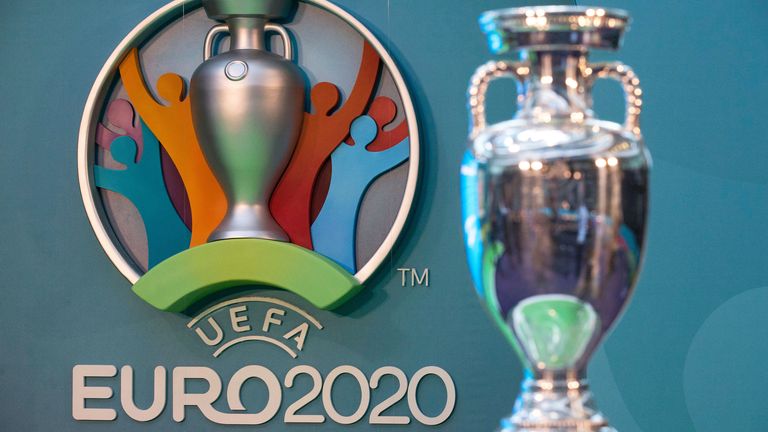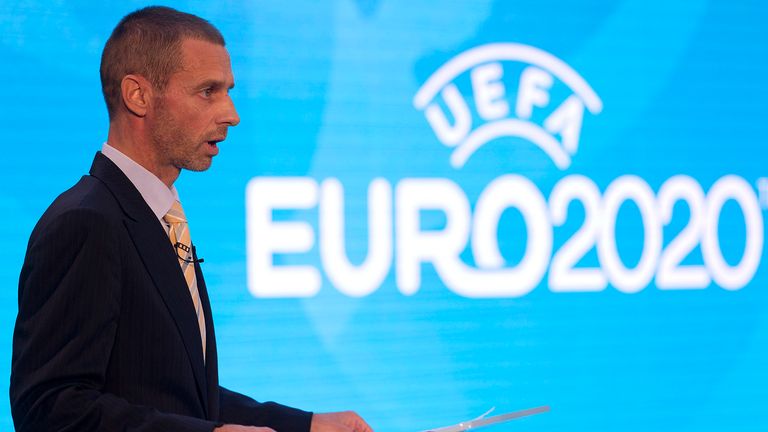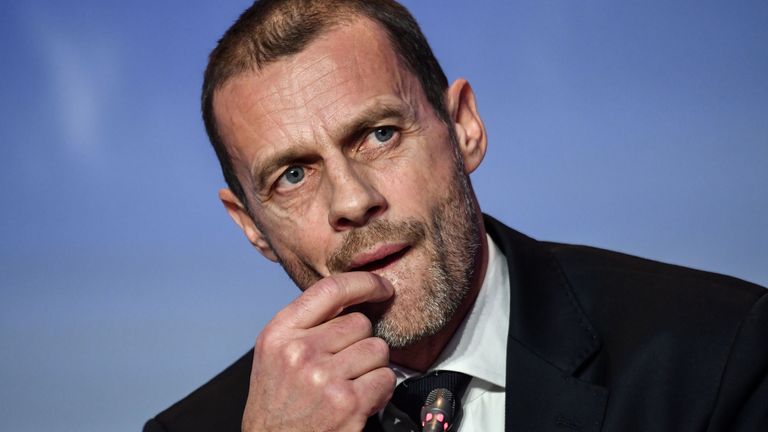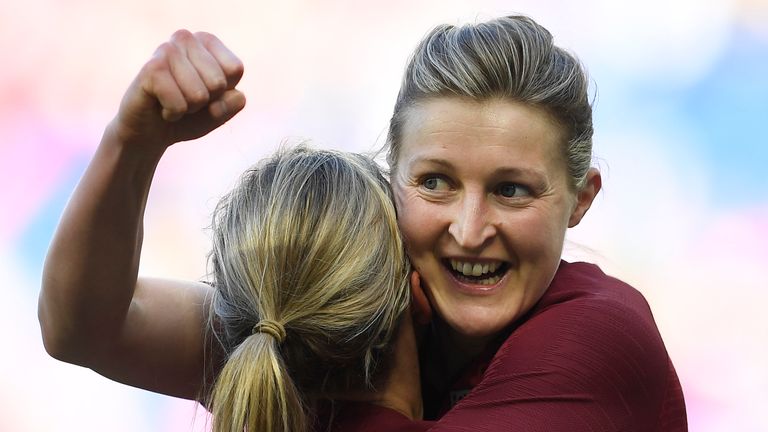Euro 2020 postponed until summer 2021; domestic leagues, UEFA competitions to be completed by June 30
UEFA postpones flagship tournament, scheduled to begin on June 12, to "help domestic competitions, currently on hold due to the COVID-19 emergency, to be completed"
Wednesday 18 March 2020 16:40, UK
UEFA has postponed Euro 2020 until the summer of 2021 amid the coronavirus pandemic, with a commitment to complete European leagues and UEFA competitions by June 30.
The news was first confirmed by the Norwegian FA on social media, with UEFA later proposing the competition will be played between June 11 and July 11, 2021.
Those dates were unanimously confirmed during a FIFA Council conference call on Wednesday and included on the 2021 calendar along with new dates for Copa America. A decision over the FIFA Club World Cup, scheduled to take place during that window, will be taken at a later date.
The playoffs for Euro 2020, which will include the Republic of Ireland and Northern Ireland, have also been postponed.
The semi-finals were originally set to take place on March 26 with the finals on March 31. Those fixtures have instead now been postponed until June.
UEFA said in a statement: "UEFA today announced the postponement of its flagship national team competition, UEFA Euro 2020, due to be played in June and July this year.
"The health of all those involved in the game is the priority, as well as to avoid placing any unnecessary pressure on national public services involved in staging matches. The move will help all domestic competitions, currently on hold due to the COVID-19 emergency, to be completed.
"All UEFA competitions and matches (including friendlies) for clubs and national teams for both men and women have been put on hold until further notice.
"The UEFA Euro 2020 Play-off matches and international friendlies, scheduled for the end of March, will now be played in the international window at the start of June, subject to a review of the situation.
"A working group has been set up with the participation of leagues and club representatives to examine calendar solutions that would allow for the completion of the current season and any other consequence of the decisions made today."
A subsequent statement from UEFA also included a "commitment to complete all domestic and European club competitions by the end of the current sporting season, i.e. 30 June 2020 at the latest, should the situation improve and resuming playing be appropriate and prudent enough."
Other changes could also see the scheduling of domestic league matches in midweek, with UEFA club competitions matches being played on weekends.
The statement also referenced possible "adaptations of the 2020/21 UEFA Champions League and UEFA Europa League qualifying rounds in case of late completion of the 2019/20 sporting season, i.e. after 30 June 2020. "
Domestic competitions across Europe were due to be finished before Euro 2020, which was to be held in 12 different cities, began on June 12.
However, leagues across the continent have been halted in response to the coronavirus outbreak, which has seen more than 169,000 people become infected around the world.
The World Health Organisation says Europe is now the epicentre of the pandemic, which originated in China.
UEFA president Aleksander Ceferin admitted the decision to postpone Euro 2020 by 12 months would be costly for UEFA but said he is determined that funding for grassroots football in its 55 member nations would not be affected by it.
"The health of fans, staff and players has to be our number one priority and in that spirit, UEFA tabled a range of options so that competitions can finish this season safely and I am proud of the response of my colleagues across European football," Ceferin said.
"There was a real spirit of co-operation, with everyone recognising that they had to sacrifice something in order to achieve the best result.
"It was important that, as the governing body of European football, UEFA led the process and made the biggest sacrifice.
"Moving EURO 2020 comes at a huge cost for UEFA but we will do our best to ensure that the vital funding for grassroots, women's football and the development of the game in our 55 countries is not affected. Purpose over profit has been our guiding principle in taking this decision for the good of European football as a whole."
Also on Tuesday, the 2020 Copa America was postponed until the summer of 2021 due to the coronavirus. The tournament had been due to take place in Colombia and Argentina between June 12 and July 12 of this year.
Analysis: Seismic moment in history of football
Sky Sports News chief reporter Bryan Swanson...
The scale and speed of the spread of coronavirus has stunned European football administrators. Only two weeks ago it was barely discussed as all 55 associations gathered in Amsterdam for UEFA Congress and the Nations League draw.
The virus was referenced "in minutes" by UEFA's top committee, as some officials in hotels joked about whether to shake people's hands.
"The focus was obviously not on coronavirus," said UEFA executive Alexey Sorokin bluntly, as St Petersburg continued its preparations to host four games including a quarter-final.
"We already reserved the hotels, it would be a problem if it doesn't happen," smiled UEFA president Aleksander Ceferin, in an interview with Sky Sports News, when asked about the semi-finals at final at Wembley.
Ceferin acknowledged his organisation was "taking it seriously" and stressed the need for a calm approach.
"The situation is stable" was the reassuring tone from organisers. But how could officials be so optimistic? Even medical experts had no idea exactly what would happen.
Rapid, deadly, developments forced the game to seriously reconsider its approach. Suddenly, players and coaches tested positive, teams were affected, competitions were suspended, travel restrictions were put in place and European countries were placed into lockdown.
The postponement of Euro 2020 is no surprise - it was impossible to provide any certainty on venues in such an uncertain climate. Financial penalties, logistical challenges and fixture congestion are conversations for another day.
This is a seismic moment in the history of football but the game knows, and understands, that public health must always remain the number one priority in these extraordinary times.
Analysis: No knee-jerk decisions from UEFA
Sky Sports News reporter Geraint Hughes...
These decisions are not being made off the hoof, they are not knee-jerk. UEFA arranged Tuesday's talks last week and that gave them room and options for not only the 55 member associations but also other stakeholders.
UEFA and FIFA would have spoken prior to these meeting. We know they have not had the greatest of relationships in the past but given the situation of the coronavirus pandemic they have realised they have to behave like grown-ups, be sensible and a breakout of common sense would prevail.
The sporting calendar is not as busy as it could be in 2021, there are not mega events like a FIFA World Cup or an Olympic Games, events that are so big in terms of global representation, athletes and commercial sponsorship.
Putting Euro 2021 into the calendar on the proposed dates of June 11 to July 11 only clashes with the Women's European Champions, another UEFA competition which runs from July 7 to August 1, and FIFA's revamped Club World Cup, which is due to run from June 17 to July 4.
There are logistical problems but could a positive be taken from this negative? Given that the women's tournament is due to be hosted by England, given that a number of games in the men's tournament - notably the semi-finals and final - are due to be hosted in England, could there be some way of combining these two tournaments and celebrating football?
Associations across Europe are looking to build and grow the women's game and there potentially there is an opportunity here.






